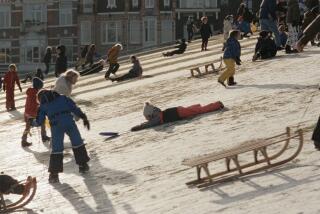Letters From Westerbork by Etty Hillesum; translated from the Dutch by Arnold J. Pomerans (Pantheon: $14.95; 156 pp., illustrated)
- Share via
As a teen-ager on her own in France, the last communication my mother had from her father, my grandfather, was a letter dated March 8, 1943, that he wrote from Westerbork refugee camp in Holland. He had adopted a cat, he wrote, naming it Graubchen, and was working in one of the camp’s kitchens. He vanished in one of the weekly transports to the East in the fall of 1944. Westerbork is an eerie name I’ve had tucked away in my consciousness as long as I can remember. Most people have never heard of it.
I read through this slender collection of vibrant, gorgeously written but agonizing letters hoping to find some mention of my grandfather, who was lost, or my grandmother, who survived the war, but there was none. Yet perhaps they had the fortune to have crossed paths with the young woman who made it her business to see to the needs of hundreds of hapless camp inmates.
Etty Hillesum was born in 1915 to a cultured Jewish Dutch family. Her father was a professor, her brother, Jaap, a doctor, another brother, Mischa, a gifted budding pianist. She traveled in artistic and educated circles and spent hours at her desk in her room in Amsterdam, writing a detailed diary (published as “An Interrupted Life,” also available from Pantheon). She wanted to do more than helplessly observe the nightmare of the German occupation of Holland and increasing persecutions of the Jews.
In 1942, Holland was in the stranglehold of the German occupation. It was at this time that the Germans launched their first massive roundups of the Jews throughout occupied Europe and that the controversial Jewish Councils were established. Leaders in Jewish communities were assigned to assuage the panicked Jewish populations. As J. G. Gaarlandt states in the brief, informative introduction to this volume, the councils’ “declared purpose was to decide who was fit to be sent away for ‘labour service’ and who was indispensable at home.” Gaarlandt goes on to write: “A discussion of the role of the Jewish Council in the Netherlands falls outside the scope of this introduction, nor is this the place to pass judgment on it.”
Etty accepted a post within the Dutch Jewish Council in July, 1942. This position exempted her from imprisonment at Westerbork. She was free to remain in Amsterdam, where she lived for a time with a lover. But she volunteered to go as a social worker to the refugee camp, originally erected by the Dutch in 1939 to hold the increasing numbers of German Jews who fled to the Netherlands before the war.
Westerbork was no longer a “refugee camp” in the classic sense. Designed to house about 1,500, suddenly it was teeming with 30,000 Jews from all over Europe. While inmates couldn’t leave the camp, for a time they could write letters, receive gifts of food and clothing from friends outside. Conditions in the camp worsened steadily. Inmates still felt linked to the world, but that link was tenuous.
Westerbork was built on a Dutch heath with brutal weather conditions. For months it rained, and there was mud everywhere. Then, dust storms, fanning powdery dirt into clothes, mouths, water. Sometimes the water was turned off. Often, there was only boiled cabbage to eat. Yet inmates wanted to remain in Westerbork as long as possible. Etty wrote to one friend back in Amsterdam: “People would rather spend the winter behind barbed wire in Holland’s poorest province than be dragged away to unknown parts and unknown destinies deep within Europe, from where only a few indistinct sounds have come back to the rest of us. But the quota must be filled; so must the train, which comes to fetch its load with mathematical regularity.” Every Monday morning, the cars were packed and sealed and the train pulled out. It would return the following Monday morning, empty.
Etty’s letters are not concerned with Etty. She is recording history, consciously. She is communicating to the “outside” what kind of society “inside” has been created. “What children here say to each other is appalling. . . . I heard one little boy say to another, ‘You know, the 120,000 stamp isn’t really any good; it’s much better to be half-Aryan and half-Portuguese.’ (A reference to the many Sephardic Jews who settled in Holland when they were ousted from Portugal in the 15th and 16th centuries.) And this is what Anne-Marie heard one mother say to her children on the heath: ‘If you don’t eat your pudding up straightaway, then Mummy won’t be with you on the transport!’ ”
Etty provides a vivid example of the Westerbork code of honor among inmates: You did not endanger your fellow prisoners. If your name appeared on the transport list, you reported. She tells of one young boy so terrified he tried to escape, was caught, and so doomed several other inmates whose names were not on the list. She feared for his treatment from others on board the train.
If there is any shortcoming to this unforgettable collection of letters, it is the difficulty, the foreignness (to this reader, in any case) of the Dutch names of the friends Etty keeps in touch with. But no matter. Who in particular she is writing to is quite beside the point: She is writing to the world.
Invariably, one will want to compare Etty’s words with those of Anne Frank. Steely poetics and a sense of the existential separate these musings from the sweet hopefulness, the yearning, the sense of future that informed Anne Frank’s diary. These are messages from beyond the Secret Annex. For Etty sees no future. She never talks about when the war will end, when the killing will stop. She only knows that it continues. “The sky is full of birds, the purple lupins stand up so regally and peacefully, two little old women have sat down on the box for a chat, the sun is shining on my face, and right before our eyes, mass murder. The whole thing is simply beyond comprehension.”
Etty’s last communique was a card thrown from out of the train she found herself on board on Sept. 7, 1943. “I am sitting on my rucksack in the middle of a full freight car. Father, Mother, and Mischa are a few cars away. In the end, the departure came without warning. . . . We left the camp singing. . . . We shall be traveling for three days.”
Etty Hillesum died in Auschwitz on Nov. 30, 1943, at age 29.
More to Read
Sign up for our Book Club newsletter
Get the latest news, events and more from the Los Angeles Times Book Club, and help us get L.A. reading and talking.
You may occasionally receive promotional content from the Los Angeles Times.










